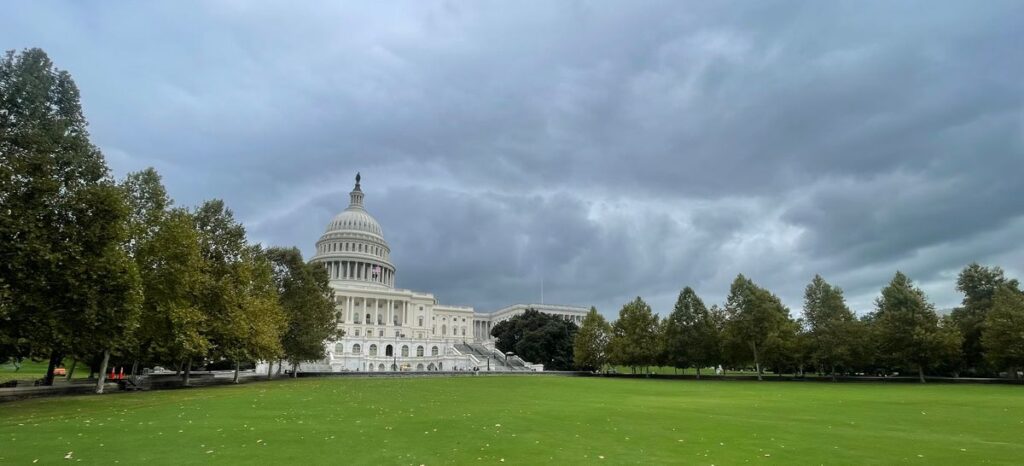
Travel and the unique experiences it provides have never been more in demand.
The same can be said for the expertise and skill of the travel advisors who turn clients’ dreams into reality and serve as a steady presence from booking to baggage claim.
That was the biggest and most uplifting takeaway from the American Society of Travel Advisors’ (ASTA) three-day 2025 Legislative Day event in Washington, D.C. this week.
“We estimate that there are 13.3 million in the U.S. looking to work with a travel advisor, fueled by firsthand experience, specializations and the ability to create bespoke trips,” said David Kolner, Executive Vice President at Virtuoso, noting that bookings with travel advisors have increased more than any other means of booking travel.
Outside of the COVID-19 pandemic at the start of the decade, few periods in the organization’s history have proved as challenging as this week’s, which tasked ASTA organizers and members with navigating a crippling government shutdown in the first year of a new yet polarizing administration keen on seemingly making as many enemies as allies.
Nonetheless, and despite the uncertainty that was fittingly accompanied by some soggy weather on Wednesday, hundreds of ASTA members from all over the country showed up on Capitol Hill this week to lobby lawmakers on important legislation.
Travel Advisors Embrace a Challenging Situation
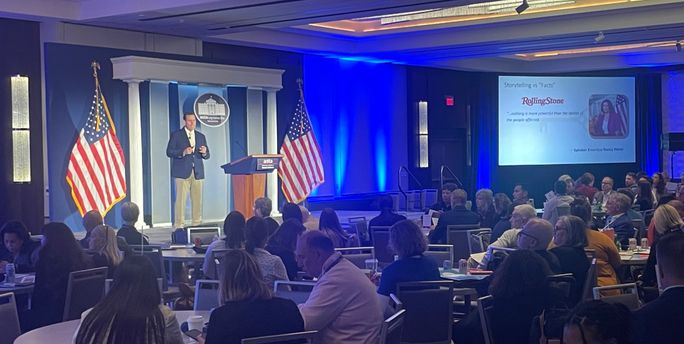
David Lusk, founder and CEO, Key Advocacy speaks at ASTA Legislative Day training at the Hilton Washington DC National Mall The Wharf. (Photo Credit: Patrick Clarke)
Unsurprisingly, the government shutdown, which continues to hamper travel, was one of the hot topics among industry leaders in Washington this week. Some meetings were canceled or moved to a virtual setting, but otherwise the event largely went on without a hitch.
ASTA was clear in its communication and attendees responded accordingly, showing up as they have in previous years, spending their own time and dollars to propel their businesses and the industry as a whole.
“Legislative Day is our opportunity to demonstrate that travel advisors are more than service providers. We are small business owners, entrepreneurs, job creators and advocates for millions of travelers,” said ASTA President and CEO Zane Kerby. “By coming to Washington, our members are putting a human face on the impact of federal policy.”
The Big Asks for 2025
ASTA members continued to push for a pair of vital bills in 2025, running back their support for the Flight Refund Fairness Act (H.R. 5556) and the ACPAC Modernization Act (H.R. 5663).
The former legislation would require airlines to reimburse the ticket agent merchant of record within seven days of a flight cancellation or significant alteration to let agencies—the vast majority of which are small businesses—off the hook for refunding their clients. This is significant in that the airline and not the agency is typically in possession of those funds.
If approved, agencies would then have seven days to return those funds to their clients.
Meanwhile, the ACPAC Modernization Act would add a ticket agent representative to the Department of Transportation’s Aviation Consumer Protection Advisory Committee (ACPAC). The committee evaluates consumer protection programs and advises on new policies, but lacks a travel advisor perspective.
ASTA members are seeking a valuable seat at the table for an industry responsible for booking some 781,000 airline tickets per day for its clients.
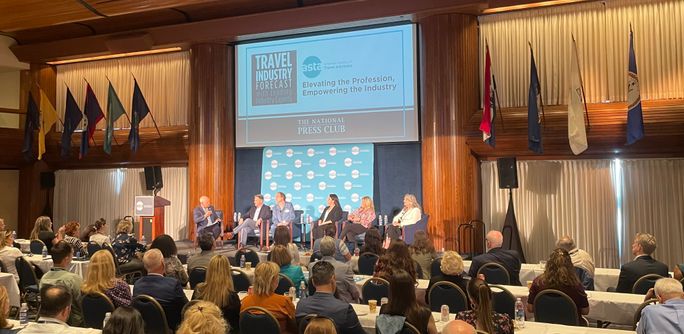
2025 ASTA Travel Industry Forecast: Elevating the Profession, Empowering the Industry panel at the National Press Club in Washington, D.C. (Photo Credit: Patrick Clarke)
The last bit of advocacy at this year’s event concerned the Modern Worker Empowerment Act (H.R. 1319/S. 2228), which aims to confront inconsistent federal definitions of worker status that create uncertainty for businesses and independent contractors alike, according to ASTA.
With travel agencies employing more than 200,000 independent contractors nationwide, conflicting classifications in regards to federal rules threaten to upend many businesses that rely on ICs. According to ASTA officials, the Modern Worker Empowerment Act would require the adoption of a “significant control and entrepreneurship” test to ensure that ICs are recognized as such under both the Fair Labor Standards Act and the National Labor Relations Act.
If passed, the legislation promises to protect jobs while also reducing litigation risk and compliance costs for travel agencies.
“Each of these bills addresses pressing issues that impact our members’ ability to serve their clients and keep their businesses thriving,” added Kerby. “Ninety-five percent of travel agencies are small businesses, and every policy that touches our industry has ripple effects in communities across the country.”
Leaving a Lasting Message on Capitol Hill
While ASTA members are limited in terms of both time and access on Capitol Hill—some meetings last only minutes and many are conducted with staffers who are not only being inundated with requests but being trusted to relay the message to the representative—simply making their presence felt in the nation’s capital and routinely getting in front of lawmakers is a winning endeavor.
“Our objective during Legislative Day is to demonstrate the essential role travel advisors play within the travel and tourism sector,” said Kerby. “By engaging directly with lawmakers, we aim to build support for policies that enable our members and their businesses to thrive. This event ensures that travel advisors have a seat at the table and a platform to share their stories firsthand.”
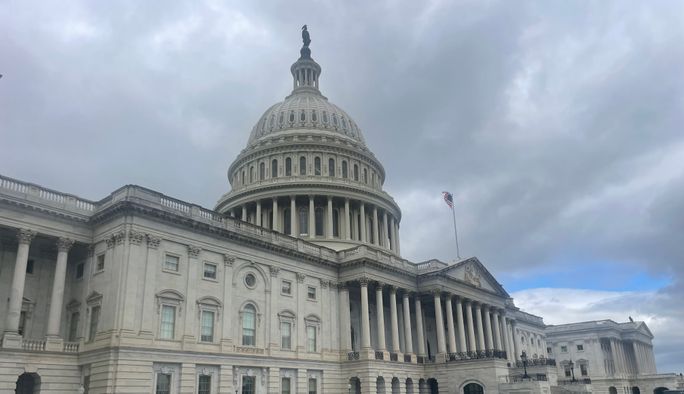
U.S. Capitol building in Washington, DC. (Photo Credit: Patrick Clarke)
Regardless of what Congress chooses to do from here, advisors and the industry they sustain made their message loud and clear during this three-day advocacy event.
“It’s very complex what we do. I think people come into the industry kind of starry-eyed, thinking that it’s going to be super easy and it’s a lot of fun once you learn how to do what you need to do. But its very complex,” Tiffany Hines, President and CEO, Global Escapes, said during a panel discussion at the National Press Club.
The emergence of artificial intelligence (AI) was another hot topic, and while advisors would seemingly benefit from distancing themselves from this new tech at a time when they’re seeking to sell lawmakers on their importance, it’s clear, that when used correctly, AI can be a tool rather than a replacement.
“I work with AI. The more I work with it gets to know me, it gets to know my style,” said Joshua Harrell, Chief Revenue Officer, WorldVia Travel Network. “It gets to know my clients or my type of clients. It’s good if I make it good. Instead of saying ‘I used AI,’ let’s say ‘I worked with AI.’ Let’s have a relationship with it.”
An Optimistic Outlook
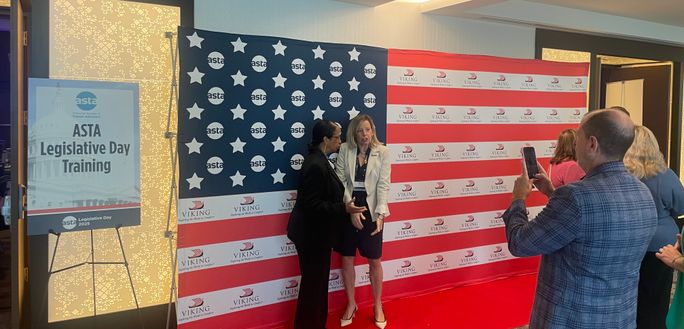
ASTA members pose for a photo at ASTA Legislative Day training at the Hilton Washington DC National Mall The Wharf. (Photo Credit: Patrick Clarke)
Travel advisors and industry advocates in attendance for ASTA Legislative Day were in lockstep in expressing an optimistic outlook for the future of the industry.
This encouraging prospect is likely the result of two key factors that a pair of industry veterans summarized beautifully.
What the industry has already and continues to survive, along with what the next generation of clientele looks like, combine to generate immense confidence.
“Time and time again. Regardless of what is thrown at us, the resilience of this industry is incredible,” said Nicole Mazza, CMO, Travel Savers. “Consumers are still looking for an advisor. A lot of things were supposed to kill us, but we’re still here and thriving.”
“The younger generation coming along is more interested in experiences than things, and they’re really embracing getting out and exploring the world,” added Hines. “That’s exciting.”
For the latest travel news, updates and deals, subscribe to the daily TravelPulse newsletter.

